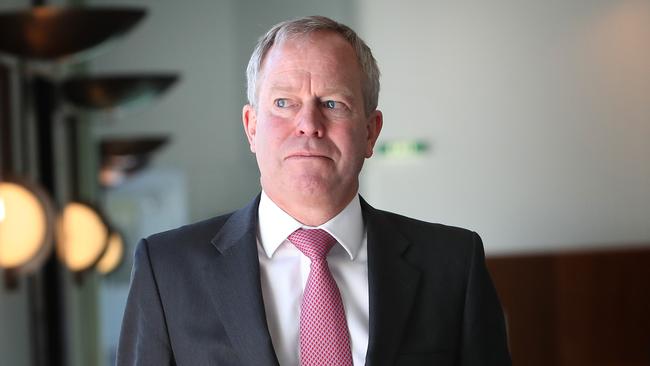Malcolm Turnbull ‘took charge’ of $443m reef meeting
Malcolm Turnbull ‘took charge’ of a meeting with John Schubert offering his charity a $443.3m grant without a tender process.

Malcolm Turnbull “took charge” of a meeting with Great Barrier Reef Foundation chairman John Schubert and former environment minister Josh Frydenberg, offering the charity a $443.3 million grant without a tender process.
Dr Schubert yesterday told a Senate committee examining the grant that he was summoned to the April 9 meeting by the former prime minister’s appointment secretary with just two days’ notice.
He said he had no idea what the meeting was about and was surprised when Mr Turnbull revealed that the charity, which had six full-time staff, had been selected to receive the grant.
“The prime minister started off and he took charge of the meeting,” the former Commonwealth Bank chairman said.
“He laid out the proposal that a reef trust partnership be formed ... He indicated the number of $443m. To the extent that I hadn’t heard anything about it, yes (I was surprised).”
Last month, The Australian revealed that Mr Turnbull met with Dr Schubert to inform him of the grant just 11 days after cabinet’s expenditure review committee had decided to “seek a commercial partner” for a Great Barrier Reef plan.
Dr Schubert said he was told at the meeting that the foundation would have to leverage extra funding from the private sector, but “no specific figure (was) raised”.
The foundation’s managing director, Anna Marsden, told the committee the charity was finalising a plan to use the public funding to raise “hundreds of millions” in extra contributions from a range of “giving markets”.
The committee heard the Australian Government Solicitor was involved in conducting due diligence on the foundation before the grant’s final approval, but the government had refused to release the assessment.
Dr Schubert said Mr Turnbull indicated the foundation’s “good governance process and the quality of the board” had been important factors in its selection. He said he would take legal advice on whether the involvement of foundation director Paul Greenfield in a nepotism scandal while he was vice-chancellor of the University of Queensland should preclude him from continuing to serve on the board.
Dr Greenfield, the head of the charity’s scientific committee, was forced to resign his UQ post in 2011 after it was revealed he had helped his daughter gain entry to a medical degree course ahead of 343 better-qualified applicants.
Labor senator Kristina Keneally suggested the scandal should prevent Dr Greenfield from sitting on the charity’s board under the grant partnership agreement, which rules out participation of directors who had previously “failed to comply with obligations owed to the commonwealth”.
Dr Schubert said he had also taken no steps to notify the government of the resignation of board member Stephen Roberts, a former country head for Citi, after he was charged in June over alleged cartel conduct.
Another board member, Business Council of Australia president Grant King, told the committee he saw no conflict with his advocacy for LNG projects at the Port of Gladstone and his role on the board. He said Australian LNG would play a “huge role in decarbonising global emissions” by helping nations such as China wean themselves off dirty coal.
Ms Marsden said the charity would take money from all businesses, “and, yes, some of these are from resource companies”.
Board member Stephen Fitzgerald, a former Goldman Sachs director, appeared before the committee as the new chairman of the charity’s philanthropy committee, which had not sat for four years before the grant was awarded. He was not quizzed on his business relationship with Lucy Turnbull.


